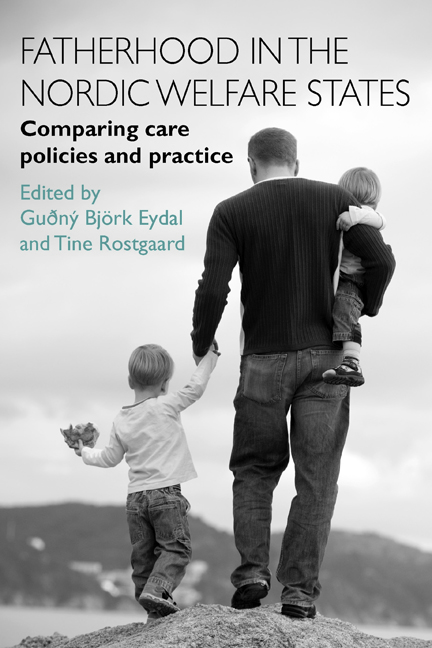Book contents
- Frontmatter
- Contents
- List of tables and figures
- Notes on contributors
- Acknowledgements
- one Introduction
- Theme 1 Fathers, families and family policies
- Theme 2 Fathers in everyday life – culture, work and care
- Theme 3 Constructing fatherhood in different family settings
- Theme 4 Caring fathers and paid parental leave policies
- Theme 5 International reflections on findings
- Conclusions
- Index
seventeen - Parental leave and fathers: extending and deepening the knowledge base
Published online by Cambridge University Press: 04 March 2022
- Frontmatter
- Contents
- List of tables and figures
- Notes on contributors
- Acknowledgements
- one Introduction
- Theme 1 Fathers, families and family policies
- Theme 2 Fathers in everyday life – culture, work and care
- Theme 3 Constructing fatherhood in different family settings
- Theme 4 Caring fathers and paid parental leave policies
- Theme 5 International reflections on findings
- Conclusions
- Index
Summary
Introduction
In recent decades, social scientists from numerous disciplines in the Nordic countries and abroad have turned their attention to the study of gender disparities in paid work and, in tandem, gender divisions of labour at home. A second voluminous literature has addressed social policies that facilitate reconciling parenthood and employment – often referred to as ‘family-friendly’ policies. Researchers tackling these policy questions have also come from multiple disciplines, and they have employed diverse analytic methods, both quantitative and qualitative; some have worked from a gender or feminist perspective while others have not.
These two large bodies of scholarship have converged in recent years around the study of leave policies, that is, policies enabling parents to take temporary breaks from paid work – with job protection, remuneration or both – to care for young children. That these groups of scholars are interested in leave is hardly surprising given that leave policies are intended to affect outcomes in both paid and unpaid work, and they are a core component of the work–family reconciliation policy package. It is also not surprising that this literature is heavily cross-national (albeit largely limited to affluent countries), because policy designs vary sharply across countries. Perhaps more remarkable is the recent and sustained swell of research focused squarely – or even exclusively – on leave policies and fathers.
In this brief chapter, I first focus on key conclusions from the existing fathers-and-leave literature – drawing substantially on my own past work. Following that, I highlight the conclusions and lessons emerging from the studies in this innovative volume.
Lessons learned until now
Research on fathers and leave has generally tackled three large, intertwined questions:
1. What leave rights and benefits are actually granted to fathers in the world's affluent countries?
2. What policy features encourage or incentivise fathers to take up the leave and benefits to which they are entitled?
3. To what extent – and where – are leave policy designs the most and least gender-egalitarian?
Several conclusions have emerged from this body of scholarship. First, as scholars have assessed the existing leave provisions for fathers – across countries – they have had to grapple with the fact that these schemes not only vary widely, but that they are also remarkably complex. Leave is often provided to fathers via father-only paternity leave schemes (which are relatively straightforward).
- Type
- Chapter
- Information
- Fatherhood in the Nordic Welfare StatesComparing Care Policies and Practice, pp. 373 - 384Publisher: Bristol University PressPrint publication year: 2014



